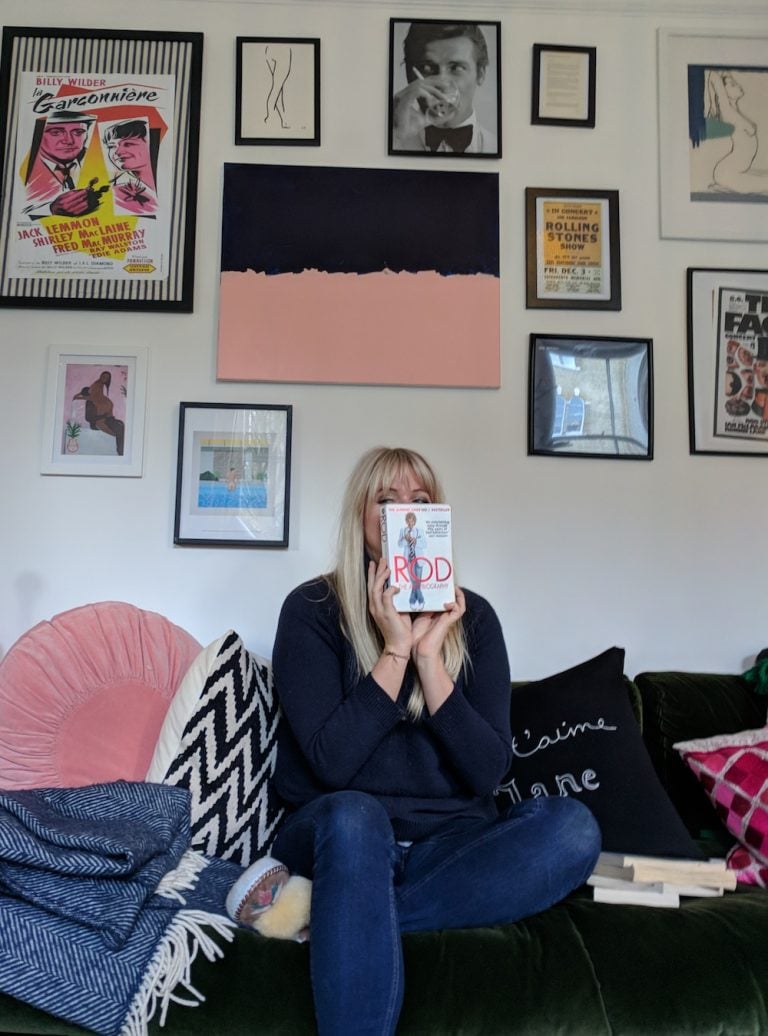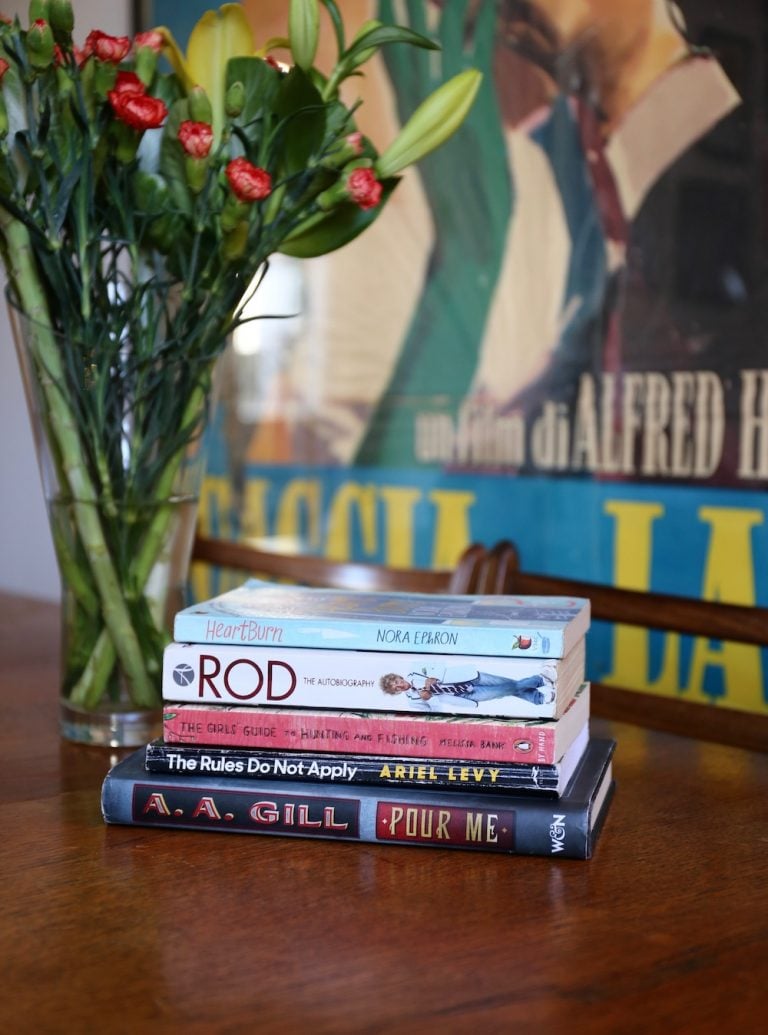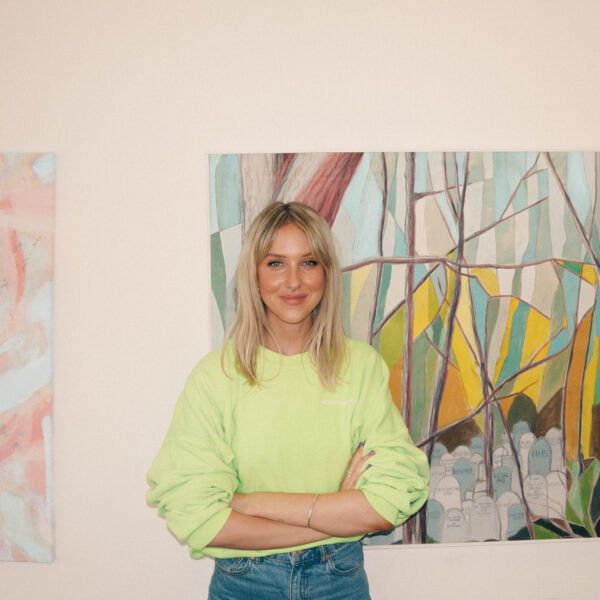
Natasha Collie
Senior Brand Marketing Manager at Penguin Random House UK
At the start of the year, Ladybird Books approached Sonder & Tell with a dream brief. In 2021, a year that’s been particularly challenging for...
In conversation with
Journalist, author Everything I know About Love, podcast host The High Low

Dolly Alderton welcomes us into her Camden flat with her “freelance trousers” on. She is, in person, like her writing – open and honest and witty, with a way of making everyone around her feel at home. It was her dating column in the Sunday Times Style that sowed the seeds of storytelling for her debut book, Everything I Know About Love. Week after week, she lifted the lid on the “liaisons” that punctuated her roaring twenties. But really it was Dolly’s fierce commitment to her female friendships that struck a chord with so many of her readers. She says: “People liked reading about girls that were silly, got drunk, spoke intimately about things and behaved with each other as if they were romantic partners.” This narrative arc – of growing up alongside bad dates and good friends – has seen her memoir become a bestseller.
Dolly has the ability to spin personal anecdotes into relatable truths. She takes tiny details and blows them up, hilariously honing in on parts of human nature that you might have thought were particular to you (we died at one particular edition of her newsletter, The Dolly Mail, in which the writer considers what it means to be a British woman: that’s nursing a single tub of hand cream for a decade; eating chips and then wiping salty fingers on your jeans). It’s a skill she admires in some of her favourite writers, like A. A. Gill and Nora Ephron. “It’s interesting how much all us journalists are guilty of eeking out a story,” she says, “of stretching out anecdotes into memoirs”.
As much as Dolly is a storyteller, she is moulded by the stories she reads. She admits, though, that she can be “quite complacent” when it comes to consuming new culture, and would rather reread Rod Stewart’s autobiography than chase every of-the-moment piece. It’s a trait she’s had to temper for The High Low, the weekly pop culture podcast she co-hosts with Pandora Sykes, but also something that makes gives her reading list a timeless feel. She says: “Reading is a creative act because you’re inventing a world in your head. It becomes part of your inner landscape”. Thanks, Dolly, for letting us in.
When I was a teenager I was obsessed with anything to do with sex and love. I was a pervert. I remember going through my mum’s shelves and finding The Joy of Sex, the Seventies seminal manual on sex and intimacy and how bodies work. I was 12 and I would just read it the entire time. Also Tulip Fever by Deborah Moggach and Forever by Judy Blume. Then I went old-school with Gone With the Wind.

I blame every love story in film, TV and books for the way I think nearly every woman behaves in relationships. Sorry to lump us all in together but I think most of us have at one point or another behaved in a pretty insane way around love and I do blame the narratives that we’re fed. That, and going to an all-girls school. I remember when someone would “go far” with a boy (some disgusting phrase for whatever they did in a cinema in Watford) and they would come back and it would be like they had been to war or got out of prison and seen the green, green grass of the real world.
Have you read Eleanor Oliphant is Completely Fine? That’s an example of a more realistic, slow-burning, respectful love story. Even Cat Person in The New Yorker. I wish I had read that story in my late teens because it’s a deconstruction of the fantasies which men and women project on each other in romantic settings.


I starting writing a dating column for Ask Men in the same month that Tinder came out. I was 24 or 25 and going out a lot and having a lot of ‘liaisons’ for want of a better word. I wanted to tell stories every week that I could latch onto a wider psychological or societal observation. So I would go out on these Tinder dates and write my observations in an investigative kind of way, rather than a memoir style narrative. It was the beginning of journalism for me and it was such a privilege.
It took me a really long time to acclimatise to what a newspaper column is. It’s basically almost fictionalised – an ongoing narrative with cliffhangers and returning characters. You have a mission, a struggle, inner thoughts, light and shade, sex and emotion. It was quite a craft. Initially I found that super cringe. I thought, why would anyone be interested in this? But in the end my editors were right. A personal narrative is what made Bridget Jones’s, Candace Bushnell’s and Bryony Gordon’s columns so successful.
The ones that did best were always the ones about my friends. Always. Because I’m in a gang of women that a lot of women have in their lives, but that aren’t written about or seen in TV or film. People liked reading about girls that were silly, got drunk, spoke intimately about things and behaved with each other as if they were romantic partners in terms of the steadfast constant-ness of their presence and their support. We went on funny adventures around London, we weren’t competitive with each other and we threw each other under the bus in order to make one another laugh.
“If there’s one thing people get from my book I really hope it’s that your friendships, particularly with women, need to be treated with the same sanctity and respect and time and love and care as your romantic relationships”
If there’s one thing people get from my book I really hope it’s that your friendships, particularly with women, need to be treated with the same sanctity and respect and time and love and care as your romantic relationships. I don’t understand this notion that that it is somehow too intense, that somehow that there is a supremacy of emotions in life and that your boyfriend trumps everything else. That you can miss anything that’s important in your friend’s life if your boyfriend wants to hang out with you. Or that if you are sharing something really important – workwise for example – then you have to celebrate with your partner and not your friends. All these small things have really broken my heart as a friend and I refuse to do it as life goes on. The more that I refuse to do it, and my friends refuse to do it, the more filled with friendship my life becomes.
Noah Baumbach’s and Greta Gerwig’s film Frances Ha tells a story of two best friends in their twenties – one of them gets engaged quite quickly and then it shows the effect it has on the protagonist. It’s one of the narrative strands in my book and I just came undone when it happened. But just because you have that sisterly bond with someone doesn’t mean that somehow you have ownership or editorial control on the story of their life to make it sure fits with the story you have written for both of you. I’ve just gone to see Greta Gerwig’s directorial debut, Lady Bird, and the friendship between the two 17-year-old girls in that really reminded me of me and my best friend growing up. She captures the all-encompassing love and frivolity and hysteria and silliness and infatuation of female friendships. And also the boring, humdrum, day-to-day domesticity with its routines and rituals and habits.

When I sat down to write it I thought it would be a story about all the different romantic relationships I’d had in my life, but they actually just weren’t that interesting. And they didn’t reflect who I was because I sort of clicked into being a different person when I was in a romantic relationship. I realised what the most meaningful relationships in my life had been my female friendships. Particularly one, Farley. I wrote all my stories of the last decade through the relationship between me and Farley and our wider group of friends – the highs and lows and the adventures we’ve been on. I realised that the romantic stories I was telling always ended the same and I always behaved in a similar way. I realised the interesting story was not re-telling boo-hoo me, but more – what is going on inside me that allows that to keep happening? So the second narrative strand, as cheesy as it sounds, ended up being the relationship with myself and a story of self-discovery. In a less Eat Pray Love way.
“Why do you feel you have to turn everything into a story?” So I told her why: Because if I tell the story, I control the version. Because if I tell the story, I can make you laugh, and I would rather have you laugh at me than feel sorry for me. Because if I tell the story, it doesn’t hurt as much. Because if I tell the story, I can get on with it. ”
The Girl’s Guide to Hunting and Fishing is a fictional memoir about a woman and everything she has learnt about love. It culminates with this wonderful story about how this character becomes hooked on the rules of entrapment and engagement with a man. “You have to not reply to his text and you have to do all this game playing”. That book definitely helped shape how I structured my own. My editor gave it to me as a gift once I had signed with her.

Nora Ephron. There are certain things that I really love in Heartburn – I love how she describes the identity we form within a couple. She talks about how when her and her husband broke up, they also had to break up with a group of friends. I’ve never read something described so perfectly. She makes the domestic and the everyday sublime and exciting and beautiful. And I love the way she weaves food into life and feeling, stories and relationships.
A.A Gill is another one. It’s interesting how much all us journalists are guilty of eeking out a story, of stretching anecdotes into memoirs. He’s the person that said that it didn’t matter that he got into journalism at the age of 38 because he had the most important thing ahead of all the other young writers, and that was experience. I am very aware that if you have this wealth of experience then you will weave and inject that into every piece you write. It sharpens your observant lens and widens your world view. Every time that you’re feeling something new in your personal life, I believe it will enrich your copy. He’s the king of that for me.


I’m going to tell a boastful story and I’ve never told anyone before. But he liked Cosmo’s and my column. I had an opportunity to have lunch with him and I was away. I felt too embarrassed when I got home to push or follow it up because I was so in awe of him and so starstruck by the thought of meeting him. And then he got ill. It’s a real lesson to me that if you have an opportunity to meet someone, or come close to someone that has meant a lot to you then you should push it as hard as you can. It will always be a huge regret that I didn’t get to tell him how important he was to me. That his words are etched on my heart. Even with musicians you love – it reminded me to just make the time because you don’t know when they won’t be here.
Everyday on Twitter. That was why I went to see Rod Stewart last summer. It was the year A.A. Gill died and I thought I’d be so angry if I hadn’t seen him live. His autobiography is such a good book. Look how many pages are overturned on mine! It’s really well written. I’ll often do a ‘what’s on your bookshelf?’ interview with magazines and I’ve said a couple times “The Rod Stewart is a brilliant rockstar memoir” – and they just take it off.

Senior Brand Marketing Manager at Penguin Random House UK
At the start of the year, Ladybird Books approached Sonder & Tell with a dream brief. In 2021, a year that’s been particularly challenging for...

Founder Of Simple Politics
Talking about serious issues doesn’t mean defaulting into a serious tone of voice, or using complicated language. If anything, accessibility, clarity and a touch of...

Brand & Community Manager at Homethings
Creating a tone of voice from scratch can be challenging. But a blank slate to work from also mean there’s room for something a bit...

Author The Little Black Book, founder Women Who

Producer Girl Going Places, Actor An African City, Writer